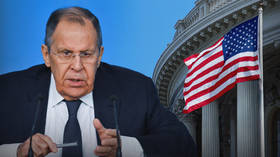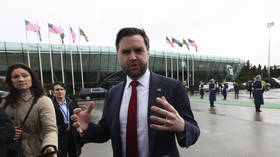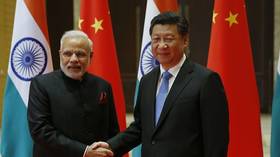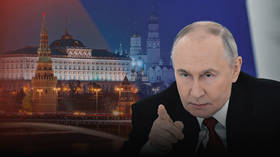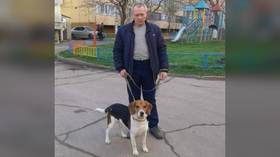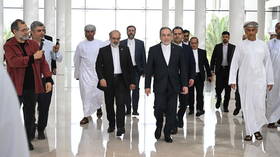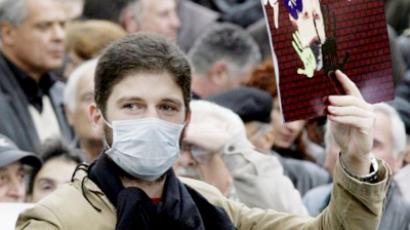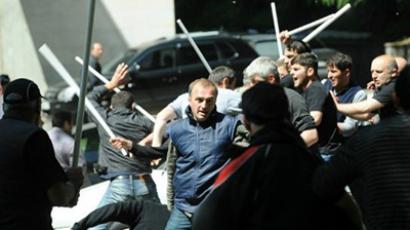Georgian police dispersed protestors in Tbilisi
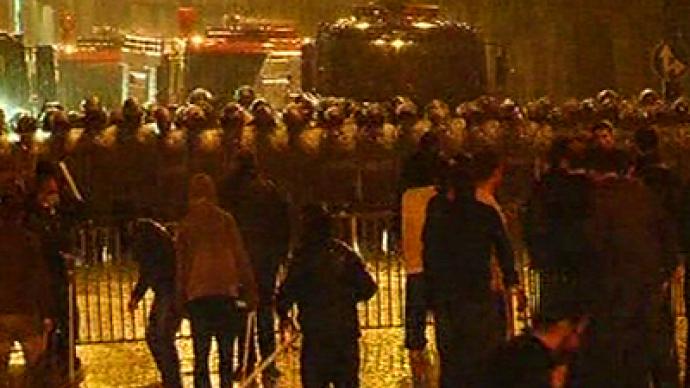
Georgian police clashed with opposition supporters in the capital Tbilisi, after the government decided to disperse the five-day long protests against the Saakashvili regime.
Georgian police clashed with opposition protestors in the capital Tbilisi after the government decided to disperse the five-day long protests against the Saakashvili regime. Police moved in to clear the streets prior to Thursday’s military parade which would mark Georgia’s Day of Independence. At least two people were reportedly killed, one of them a policeman run over by a car driven by protestors, and 40 more injured when riot police moved in to disperse opposition demonstrators on Freedom Square late Wednesday night. Opposition activists claimed police beat protesters who had already been arrested and were not resisting. What was proclaimed by the opposition as the day that would see the ousting of Mikhail Saakashvili and “determine Georgia’s future,” ended in violence.
Fighting for freedom on Freedom Square
Thousands of protesters had planned to stay in the center of Tbilisi overnight, in order to block authorities from holding an Independence Day military parade.Opposition forces were demanding the resignation of President Mikhail Saakashvili, who they accuse of abusing his position to maintain his grip on power, as well as to end to what they say is state-sanctioned corruption. After the midnight deadline passed and the opposition remained on Freedom Square in downtown Tbilisi, an impressive force of riot police moved in on the crowd just after midnight, mere minutes into Georgia’s Day of Independence. Columns of police were on both sides of the street surrounding the demonstrators. Despite the heavy rain and thunderstorms, the crowd did not diminish, standing their ground. Police used brutal measures to disperse the crowd, which included many middle-aged and older people. As the police closed in, they opened up with water cannons into the crowd. Rubber bullets and gas followed, seriously injuring demonstrators and journalists.One police officer was killed after being run over by a car, while one protestor died in front of the parliament building, according to Georgian officials.“We were standing peacefully when riot police kicked me onto the ground and started beating me. My relatives also suffered – they smashed one of my friend's face and left another one unable to stand,” a protestor told an opposition television channel.“You can see from my face how much force they used. Thank God I'm even alive, those people don't value human life,” said another protestor with bruises clearly visible on his face.
The Silver revolution
The protests were dubbed the “Silver Revolution” due to the great number of silver-haired elderly protestors demonstrating against low pensions and high food prices. They were led by an opposition demanding an end to what they say is an undemocratic and authoritarian leadership.For five days, they held vigil outside of the main television building in Tbilisi, before taking their protest to the steps of parliament. The initial numbers of protestors over the weekend fell after disputes among the opposition parties, but a crowd of around 3,000 rallied on Wednesday night before the police violence erupted.“The police had to use force, [because] part of the demonstrators resisted violently,” explained Georgia Interior Ministry spokesperson Shota Utiashvili.The demonstrators were vastly outnumbered. Witnesses to a previous brutal crackdown against the opposition in November 2007 – when a massive force of Georgian police used the same harsh measures to disperse thousands of demonstrators, injuring almost 600 people – say that this time the security forces were present in much greater strength. Many protesters were detained, with some handcuffed before being loaded onto buses for interrogation.Before the rally began, the opposition co-leader Nino Burjanadze said she might hold negotiations with the government officials, but that did not happen. The protestors wanted Saakasvilli out, but instead the protests ended where they started – in violence and bloodshed.
The morning after
Mere hours after the brutal crackdown on protesters, service members proudly marched past the Georgian parliament in the capital of Tbilisi under the watchful eye of President Saakashvili in a military parade dedicated to the country’s independence, which was first proclaimed on May 26, 1918. It later became known Thursday that the Tbilisi City court has sentenced some 90 protesters to administrative arrest for periods as long as two months, Georgian Interior Ministry spokesman Shota Utiashvili told a press briefing on Thursday. The police published an audio recording of a telephone conversation between opposition co-leader Nino Burjanadze and her son Anzor Bitsadze, in which they discussed how the Georgian Armed Forces would show little enthusiasm in taking the opposition’s side, though they would be able to handle the police. Utiashvili said that police has evidence that some of the protest organizers were considering a possible change of administration through riots, one of them being this recording, reports Interfax.Questions have already been raised about whether the use of force can be justified with the Russian Foreign Ministry calling the dispersal of the protest rally in Tbilisi a flagrant violation of human rights requiring an international investigation."Georgian officials agreed with this criticism in principle and said they were ready to fulfill the recommendations of the UN Human Rights Council. Their actions contradict their promises, as we can see," Foreign Ministry spokesman Aleksandr Lukashevich told a Thursday press briefing. Earlier, the UN Human Rights Council had seriously criticized the Georgian authorities.


